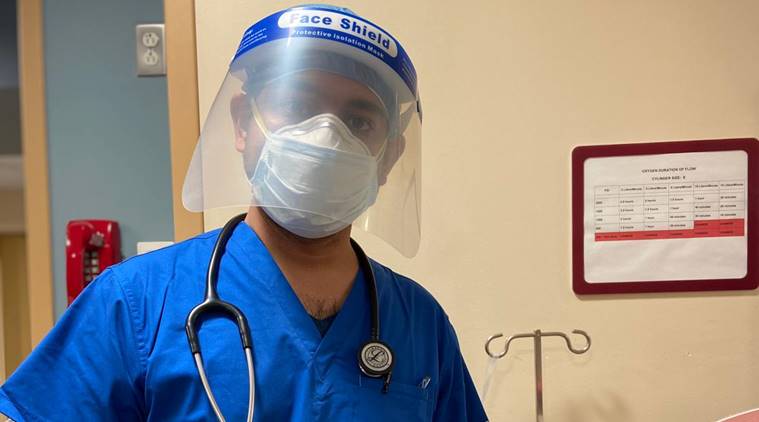‘Sad to know how doctors who died treating Covid-19 patients in India are not given proper farewell’
Siddharth Bhesania, a 32-year-old physician attached to a prominent community hospital in Brooklyn in New York City, showed symptoms of COVID-19 on March 20, beginning with sore throat, cough, breathlessness and fever running up to 102 degrees Celsius.
 Siddharth says that recovering from COVID-19 and going back to work to be in the front line again is exactly what he has been preparing for.
Siddharth says that recovering from COVID-19 and going back to work to be in the front line again is exactly what he has been preparing for.
It was at the beginning of March when New York City in the US saw its first COVID-19 case of a health worker who has returned from Iran — almost a month after the country reported the first case. Within days, the figures had already started increasing. That was when Siddharth Bhesania, 32-year-old physician attached to a prominent community hospital in Brooklyn in the city, and his doctor wife Janki, 31, decided that it was time to shift their two daughters, aged 4 and 18 months, to their parents in India.
Janki travelled to Vadodara with her two daughters to drop them off at their grandparents —prominent Otolaryngologist Dr R B Bhesania and his singer wife Falguni — and returned to New York. All this while, Siddharth continued to work at the hospital.
“Every night, each of the four or five doctors at the hospital on the night shift admitted up to six or seven patients in the beginning of March. This is in addition to the admissions made by a bigger team of doctors during the day. Things have become better now with only about 20-30 cases in the entire day, but it is a long way to go,” says Siddharth.
On March 20, while he was still on his night shift, Siddharth showed symptoms beginning with sore throat, cough, breathlessness and fever running up to 102 degrees Celsius. He worked with symptoms for two days before his body gave up.
“I couldn’t report to work on the day before my shift was to end. I had thought I would be able to finish the shift and take a break but I could not report. When they tested me, I was positive as expected because I knew I had contracted the virus,” he says. Within a day or two, his wife Janki, who is also a doctor but on a break to raise their children, also turned symptomatic and the couple quarantined in two different rooms in the house.
“I am sure Janki got the virus from me because she didn’t step out. So, while she quarantined in the bedroom, I took a hallway space and we maintained distance, only calling out to each other loudly once in a while and face timing to see each other even in the same house,” he says.
“For about 10 days I took complete rest from work and I was feeling better. Since my symptoms had gone, my superiors at the hospital asked me to report to work,” he says. The young doctor later took an antibody test that revealed that he had developed immunity to the virus.
Janki, however, is yet to completely recover. “She still has mild symptoms but is doing much better than before. She has also signed up as a volunteer doctor to help in healthcare services in New York right now as per the request of the administration here urging anyone with work permits in the sector to come forward and help. Once she recovers, she will also join hospital,” Siddharth says.
While the couple certainly misses the girls, Siddharth says, “Since both of them are so young, they do not know anything about the pandemic. Speaking to them is definitely something we look forward to when she tells us how she finished her homework or meals,” he says.
Siddharth says that recovering from COVID-19 and going back to work to be in the front line again is exactly what he has been preparing for. “When we signed up for this, the doctors, nurses, sanitation workers, cleaners, ambulance drivers and everyone else associated with healthcare knew that sooner or later we would be exposed to some kind of infection or virus,” he says.
Siddharth says that with the number of mortalities and also critical patients needing attention, most doctors tend to skip the mandatory PPE suits. “The guidelines about the PPE suits have been changing. But we do have a mandatory N95 mask covered with surgical mask that is disposed of after we check every patient. We also use head cover but not always an entire PPE suit,” he says. With the large number of positive cases, many asymptomatic patients are sent back home and asked to follow the instructions of self-isolation, he says.
Talking about India, Siddharth says, “It is disturbing to read stories from India about how doctors who died treating patients didn’t even get an honourable farewell. That is not how we are treated here (NYC). Our hospital received over 5,000 masks and 15,000 PPE suits from donors. Every day at 7:00 pm, the fire department rings its siren as an appreciation for our work and residents join in applause. That is our reward.”







